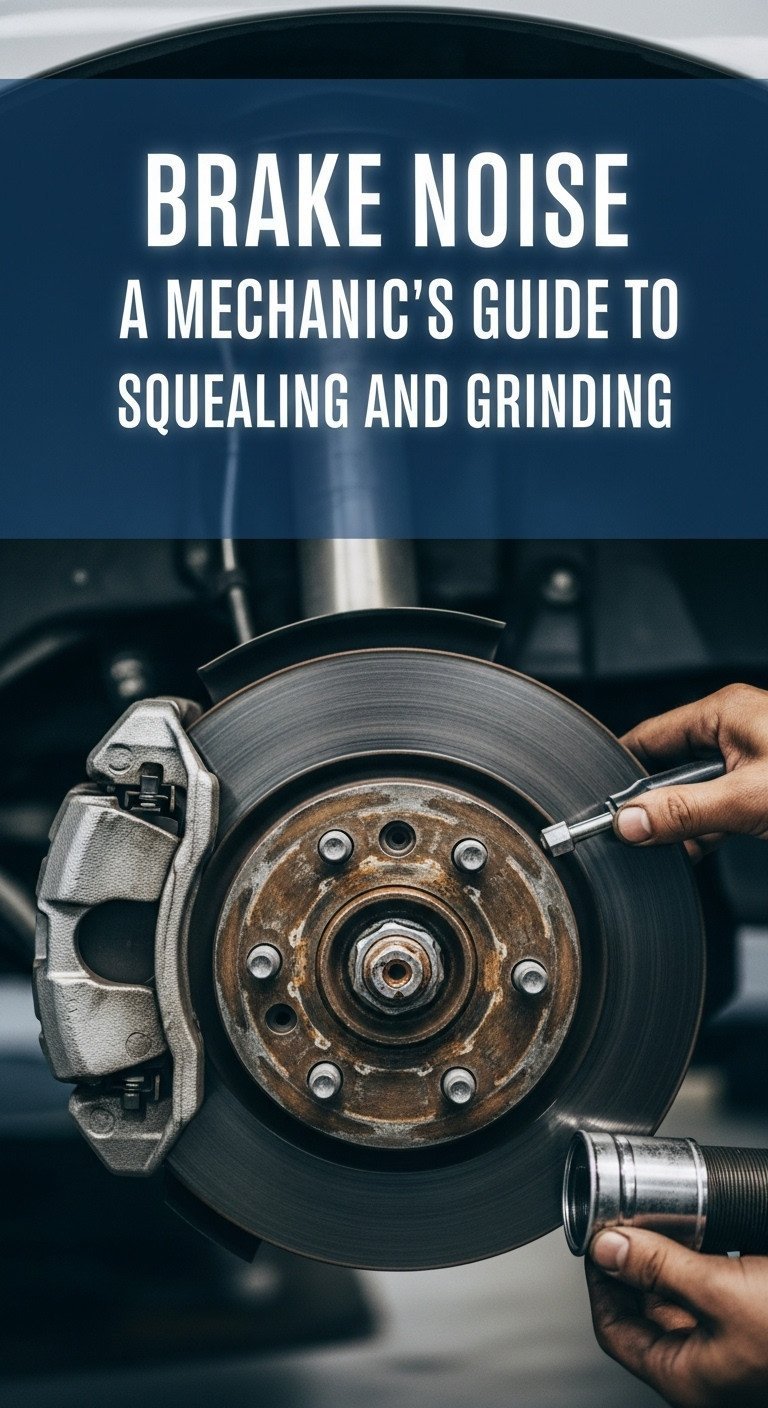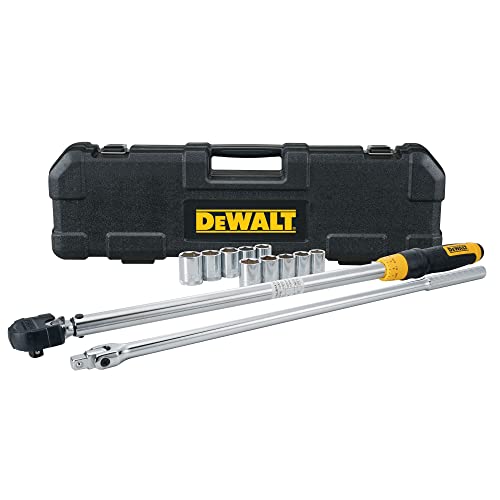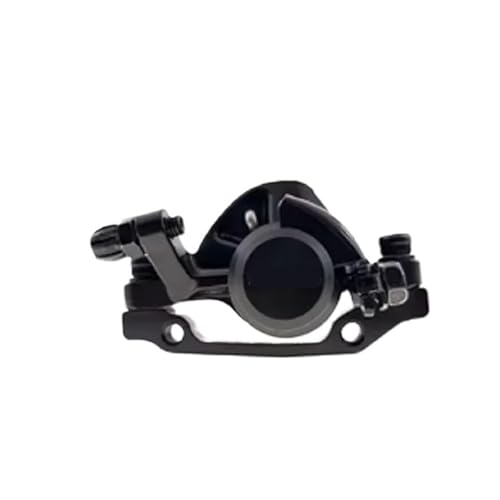That strange noise you hear when braking can be unsettling. It’s a sound that instantly makes you question your car’s safety.
Brake noise is your vehicle’s way of communicating a problem. These sounds signal issues ranging from normal wear to critical failures, and understanding them is key.
Brake noises are signals from your car’s braking system indicating issues that require attention. This guide will help you decode those sounds, from a simple squeal to a dangerous grind, so you know exactly what to do next.
Key Facts
- Noise is Communication: Brake noise is an intentional or unintentional signal indicating wear, malfunction, or the need for maintenance in your vehicle’s most critical safety system.
- Grinding is a Critical Warning: A deep, grinding noise almost always indicates the brake pads are completely worn, leading to metal-on-metal contact that severely damages other components, according to certified mechanic best practices.
- Vibration Points to Rotors: A pulsating or vibrating feeling in the brake pedal or steering wheel is a classic symptom of warped brake rotors, which can compromise stopping power.
- Squealing is an Early Warning: The common high-pitched squeal is often the sound of a built-in brake wear indicator, a safety feature designed to alert you that your pads are getting low.
- Ignoring Noises Increases Costs: Addressing a warning squeal early can be a simple brake pad replacement, but ignoring it until it becomes a grind can increase repair costs by over 300% by requiring new rotors and calipers, based on auto repair industry observations.
What Are the Most Common Brake Noises and What Do They Mean?
The most common brake noises are squealing, grinding, and vibrating, each pointing to a different issue within the brake system. From a simple wear indicator to a severely damaged rotor, these sounds are your car’s primary way of telling you that the brake system needs inspection. As a certified mechanic, I’ve designed this guide to help you quickly understand what these sounds mean for your safety and your wallet.

The best starting point is a quick diagnostic chart. Find the sound you’re hearing in the table below to understand the likely cause, its severity, and the recommended course of action. This provides an immediate information gain that many guides lack, helping you assess the situation quickly.
| Sound You Hear | Most Likely Cause(s) | Severity Level (1=Low, 5=Critical) | Recommended Action |
|---|---|---|---|
| High-Pitched Squeal | Brake pad wear indicators, Glazed pads/rotors, Vibration | 2 – 4 | Inspect brake pads soon. |
| Deep, Harsh Grinding | Brake pads completely worn; metal-on-metal contact | 5 (Critical) | Stop driving immediately. Tow to a mechanic. |
| Vibrating/Pulsating | Warped brake rotors, Uneven pad material transfer | 3 – 4 | Have rotors inspected and likely replaced/resurfaced. |
| Clicking/Ticking | Loose brake pad hardware, Debris, Loose caliper | 2 – 3 | Inspect for loose components or foreign objects. |
| Thumping/Clunking | Loose caliper bolt, Severely warped rotor, Suspension issue | 4 – 5 | Immediate professional inspection required. |
| Hissing (Pedal) | Vacuum brake booster leak | 4 | Professional diagnosis needed; braking assist may fail. |
When Should You Stop Driving Immediately? A Critical Safety Checklist
As a certified mechanic, I urge you to never ignore critical brake failure warning signs. While some noises are simple warnings, others indicate an immediate and severe risk to your safety. Your brake system is the most important safety feature on your vehicle. If you experience any of the following symptoms, pull over safely as soon as possible, turn off the car, and call for a tow.
- ❗ A Loud, Metallic Grinding Noise: This is the universal sign of complete brake pad failure. Continuing to drive can cause a total loss of braking ability on that wheel.
- ❗ A “Spongy” or Soft Brake Pedal: If your brake pedal feels soft, goes down further than usual, or sinks to the floor, it could signal low brake fluid, air in the brake lines, or a failing master cylinder.
- ❗ The Brake Warning Light is On: An illuminated red or yellow brake warning light on your dashboard is a direct order from your car’s computer to get the system checked immediately.
- ❗ Your Car Pulls Sharply to One Side: If the vehicle veers left or right when you brake, it could mean a brake caliper is stuck or a brake hose has failed, causing dangerously uneven braking forces.
According to the NHTSA, brake system failures are a significant factor in vehicle crashes. Ignoring these signs is not worth the risk to yourself, your passengers, and others on the road.
What Causes a High-Pitched Squealing or Screeching Noise When Braking?
A high-pitched squeal from your brakes is most often the sound of the brake wear indicator. This is a small metal tab built into the brake pads that contacts the brake rotor when the pad material wears down to a minimum safe level, serving as a built-in alarm that it’s time for a brake service. However, this isn’t the only cause. The squealing can also be the result of high-frequency vibration between the pads and rotors, a condition known as glazing, or even simple moisture on the rotors.
Why Do Brake Wear Indicators Squeal?
The brake wear indicator is a small metal tab on the brake pad designed to contact the rotor when the pad material is low. Think of it as an alarm clock for your brakes. It’s a simple, effective safety feature engineered to make a persistent, annoying high-pitched noise that you can’t ignore. When you hear this sound, it’s a clear warning that your brake pads have reached the end of their service life and should be replaced soon. It’s a signal for maintenance, not an immediate failure.
Could It Be Vibration or Glazed Pads?
Yes, sometimes a squeal is caused by high-frequency vibration, not wear. This can happen even with new brake pads. Imagine the sound a wet finger makes when running around the rim of a wine glass—that’s a similar principle. This vibration can occur if the brake pad shims are missing or if the contact points on the brake caliper weren’t properly lubricated with high-temperature grease during installation.
Another cause is “glazing,” where the surfaces of the brake pads and rotors become hardened and smooth from excessive heat. This slick surface can cause a squeal, especially when you are braking lightly.
What if the Squeal Only Happens in the Morning or Rain?
This is the most common ‘no-problem’ brake noise we hear about, especially in humid climates. When your car sits overnight or in the rain, a very thin layer of surface rust naturally forms on the cast iron brake rotors. When you first drive and apply the brakes, the pads scrape this rust layer off, causing a temporary squeal or light scraping sound. If the noise goes away after the first two or three stops, it is considered normal and is no cause for concern.
What Does a Deep Grinding or Scraping Noise Mean When I Brake?
A grinding brake noise means your brake pads are completely gone, and the metal backing plate is scraping against the metal rotor. This is a critical safety issue causing severe damage. Stop driving immediately and have the vehicle towed for repair. This is not a warning; it is a sign of an active mechanical failure that severely compromises your ability to stop the car safely. The sound is harsh, deep, and often feels as bad as it sounds.
Ignoring this sound is incredibly dangerous and expensive. In my shop, I’ve seen the consequences firsthand: a customer who ignores a squeal often ends up with a $1,000+ repair bill for grinding, when the initial fix for the squeal would have been around $300.
How Does a Worn Pad Cause Grinding?
Your braking system works by pressing a brake pad, which has a friction material surface and a steel backing plate, against the metal brake rotor. The friction material is designed to wear away over time. When it’s completely gone, the only thing left to press against the spinning rotor is the steel backing plate. This metal-on-metal contact creates the awful grinding noise and rapidly destroys the surface of the rotor, generating immense heat and drastically reducing your stopping power. Continuing to drive will quickly ruin the rotor and can even damage the brake caliper.
Could Debris Cause a Grinding Noise?
While less common, it’s possible for a small rock or piece of road debris to get lodged between the brake pad and rotor. This can also happen if debris gets caught in the thin metal dust shield behind the rotor. The sound is usually more of a consistent, high-pitched screech or scrape rather than the low-pitched, harsh grind of a worn-out pad. It often happens constantly while driving and may change pitch when you brake. While not as critical as metal-on-metal grinding, it should still be inspected right away, as the debris can score and damage the rotor surface.
Why Does My Car or Steering Wheel Vibrate When I Brake?
Vibration during braking is typically caused by warped brake rotors. The uneven surface of the rotor causes the brake pads to pulse against it as it spins, which you feel as a shake in the steering wheel or a pulsation in the brake pedal. If you feel the shaking primarily in the steering wheel, the issue is with the front brakes. If you feel it more in the pedal or the seat of the car, it could be the front or rear brakes.
What most guides miss is that “warping” is often a misnomer. It’s rarely a physical bend in the metal disc. More often, it’s an uneven thickness caused by the transfer of brake pad material onto the rotor’s surface in patches. This creates high and low spots that the pads grab onto unevenly. An expert insight few discuss is that a common cause for this is incorrect lug nut torque. When wheels are installed and the lug nuts are over-tightened unevenly, it can distort the rotor and hub, leading to this vibration.
What Causes a Clicking, Ticking, or Rattling Noise When I Brake?
A clicking noise when you apply or release the brakes is often due to the brake pads shifting slightly in the caliper. This can be caused by missing or worn anti-rattle clips or an improper fit. These small metal clips are designed to hold the brake pad snugly in the caliper bracket, and when they lose tension or are missing, the pad can move slightly, creating a “click” as you brake.
An important diagnostic clue is the timing. A click that happens once when you first press the pedal is the pad shifting. A rattle that is constant when you’re driving but stops when you apply the brakes is a clear sign that loose clips are being secured by the pressure. While not immediately dangerous, this movement can cause uneven pad wear over time and should be inspected. Ensuring these small hardware pieces are replaced during any brake job is a pro tip for a quiet, long-lasting repair.
Is a DIY Brake Job a Good Idea? What’s a Mechanic’s Advice?
A DIY brake job can save money but involves significant safety risks if done incorrectly. As a mechanic, I’ve seen both successful DIY projects and dangerous mistakes. The brake system is not the place to learn by trial and error. Before you even think about buying parts, you need to honestly assess your skills, tools, and understanding of the risks involved. The most common DIY mistake I see is failing to use a torque wrench, which can lead to warped rotors or, even worse, a wheel coming off.
Here’s the checklist I give to aspiring DIYers to help them decide.
You might be ready for a DIY brake job if:
* You own a quality set of tools, including a torque wrench and proper jack stands (never work under a car supported only by a jack).
* You have a vehicle-specific repair manual and have read the procedure thoroughly.
* You have prior mechanical experience and are comfortable with safety-critical repairs.
* You understand the importance of details like proper lubrication and torque specifications.
You should call a professional if:
* You are not 100% confident in your ability to perform the job safely and correctly.
* You don’t have the required tools, especially a torque wrench and jack stands.
* The issue is more complex than a simple pad and rotor replacement (e.g., spongy pedal, ABS light is on).
* You value the peace of mind that comes with a warranty and professional accountability.
FAQs About why does my car make a noise when i brake
Why Are My New Brakes Making Noise?
It’s often normal for new brakes to make a slight squeaking or scraping noise for the first 50-100 miles. This is part of the “bedding-in” process, where the new pads create a uniform layer of friction material on the rotors. However, any loud grinding, clicking, or vibration is not normal and indicates an installation or part issue that needs immediate re-inspection.
Is It Normal for Brakes to Squeak When It Rains or in the Morning?
Yes, this is very common and usually harmless. A thin layer of rust forms on the iron brake rotors in damp conditions. When you first drive, the brake pads scrape this layer off, causing a temporary squeak or light grinding sound that should disappear after the first few stops.
How Long Can I Safely Drive with Squealing Brakes?
You shouldn’t ignore it, but it’s not an immediate emergency. A squeal is a warning, typically from the wear indicator, that your pads are getting low. You likely have a few hundred to a thousand miles before they become dangerously thin, but it’s best to schedule a service appointment soon to avoid more expensive rotor damage.
What’s the Difference Between Squealing and Grinding Brakes?
Squealing is a high-pitched warning; grinding is a loud, destructive cry for help. A squeal means your brake pads are low. A deep, harsh grinding means the pads are completely gone, and metal is scraping against metal. Squealing means “get service soon,” while grinding means “stop driving now.”
How Much Does It Typically Cost to Fix Brake Noise?
Costs vary widely, from under $100 to over $1,000. A simple fix like lubricating parts could be minimal. A standard front brake job with new pads and rotors typically costs between $300 and $600. If grinding has damaged the rotors and calipers, the cost can easily exceed $1,000.
Key Takeaways: A Mechanic’s Summary on Brake Noise
- Noise is Communication: Your brakes don’t make noise for no reason. Each sound is a piece of data telling you about the system’s health.
- Squealing is a Warning, Grinding is an Emergency: A high-pitched squeal is your early warning to get your pads checked. A deep, metallic grind means stop driving immediately to prevent severe damage and potential brake failure.
- Vibration Means Rotors: A shaking or pulsating feeling in the steering wheel or pedal almost always points to warped or uneven brake rotors that need service.
- Context Matters: Pay attention to when the noise happens—light braking, hard braking, in the rain, or when cold. This context is a key clue for an accurate diagnosis.
- Don’t Delay Repairs: Ignoring a simple warning squeal can turn a $300 brake pad replacement into a $1,000+ job that includes new rotors and calipers.
- Safety Is Non-Negotiable: The braking system is the most critical safety feature on your vehicle. If you are ever in doubt, err on the side of caution and have it inspected by a certified professional.
Final Thoughts on Decoding Your Car’s Brake Noises
Understanding the sounds your vehicle makes is a crucial part of responsible car ownership. The noises your brakes produce are not random; they are a clear communication system designed to alert you to needed maintenance or potential danger. By learning to distinguish a simple morning squeak from a destructive grind, you empower yourself to make safe, smart, and cost-effective decisions.
Remember the most important rule from any mechanic’s playbook: if in doubt, get it checked out. Your safety, and the safety of others on the road, is always the top priority.
Last update on 2025-11-26 / Affiliate links / Images from Amazon Product Advertising API








